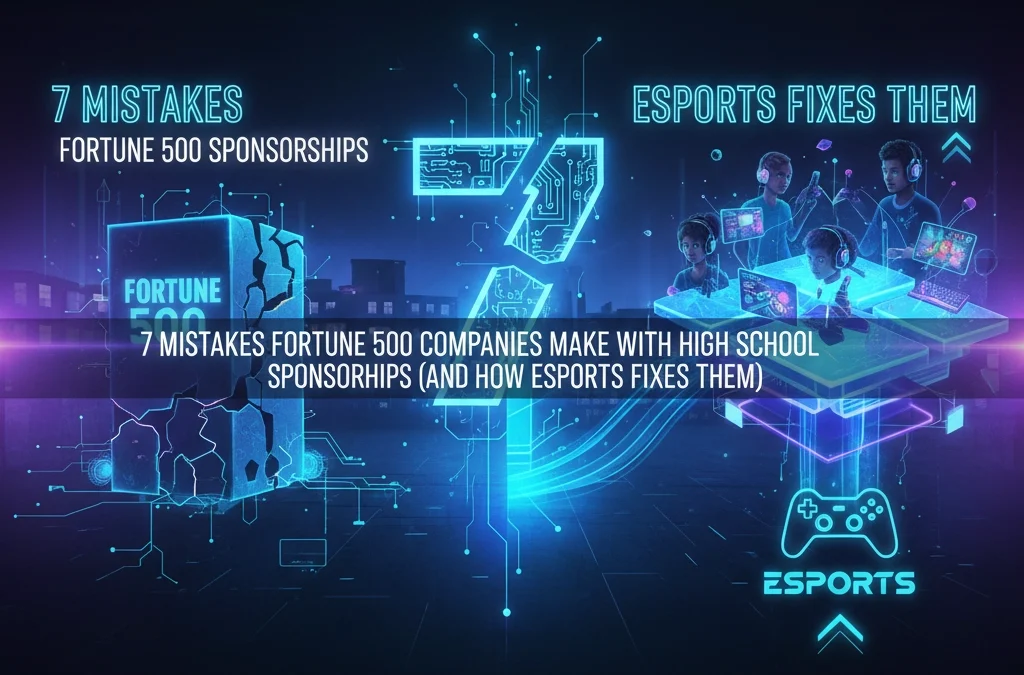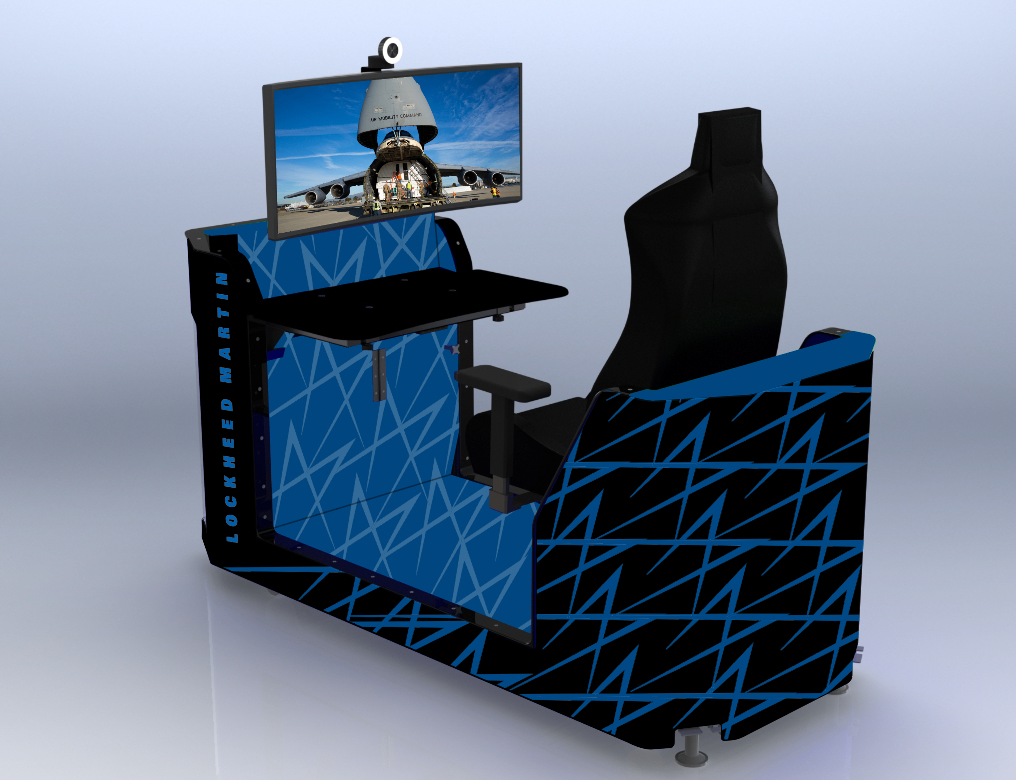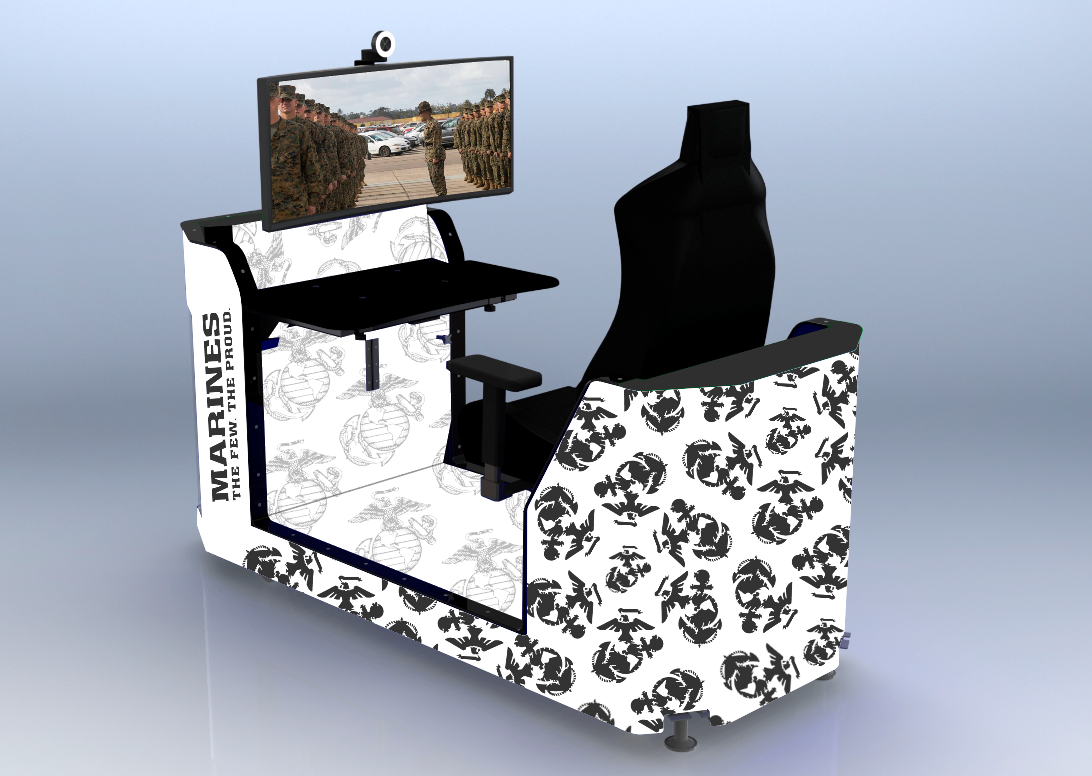Fortune 500 companies spend billions annually on high school sponsorships, yet most are missing the mark entirely. While traditional sports sponsorships dominated the landscape for decades, a seismic shift is occurring that smart brands are already capitalizing on. The companies getting left behind are making critical mistakes that cost them authentic engagement, meaningful ROI, and access to the most coveted demographic in America: Gen Z.
The solution? High school esports partnerships that deliver everything traditional sponsorships promise: and actually follow through.
Mistake #1: Focusing on Passive Brand Exposure Instead of Active Engagement
The Problem: Traditional high school sports sponsorships rely on static banners, stadium naming rights, and uniform patches. Students see your logo, but they don't interact with your brand. You're paying premium prices for wallpaper advertising that gets ignored by digitally-native audiences who've mastered the art of tuning out irrelevant marketing.
How Esports Fixes It: Esports sponsorships create interactive touchpoints throughout the entire student experience. When students compete on branded gaming pods, use sponsored equipment, and participate in career simulation programs, they're actively engaging with your brand for hours, not seconds. This immersive approach transforms passive viewers into active participants who develop genuine brand affinity.
Mistake #2: Ignoring the Fraud and Scam Epidemic
The Problem: The Better Business Bureau has issued multiple warnings about fraudulent high school sports sponsorship schemes costing companies thousands of dollars. Scammers create fake partnerships with schools, produce convincing marketing materials, and disappear with sponsorship payments. Fortune 500 companies are losing significant budget to these sophisticated operations.
How Esports Fixes It: Legitimate esports education partnerships operate through established, verifiable channels with transparent reporting structures. Companies work directly with schools, receive detailed usage analytics, and maintain ongoing relationships with educators and administrators. The digital nature of esports creates automatic audit trails that make fraud nearly impossible to execute.
Mistake #3: Targeting the Wrong Generation with Outdated Strategies
The Problem: Traditional high school sports sponsorships were designed for generations that valued different things. Millennials and Gen Z students don't respond to the same marketing triggers that worked for Boomers and Gen X. These audiences demand authenticity, purpose, and meaningful interaction: not corporate logos slapped onto existing infrastructure.
How Esports Fixes It: Esports represents the native language of digital generations. Students who spend 40+ hours per week gaming see esports partnerships as legitimate career pathways, not interrupting advertisements. When Fortune 500 companies sponsor esports programs, they're speaking directly to student interests and aspirations, creating natural brand alignment that feels organic rather than intrusive.
Mistake #4: Accepting Unmeasurable ROI and Vanity Metrics
The Problem: Traditional sponsorships offer vague promises about "brand exposure" and "community goodwill" without providing concrete data about engagement, conversion, or long-term impact. Companies spend six-figure budgets based on attendance numbers and demographic assumptions, never knowing if their investment actually influenced student behavior or brand perception.
How Esports Fixes It: Digital-first esports programs generate unprecedented data about student engagement, skill development, and brand interaction. Companies receive detailed analytics about pod usage, simulation completion rates, career pathway interest, and post-graduation employment trends. This data-rich environment enables continuous optimization and clear ROI measurement that traditional sponsorships simply cannot match.
Mistake #5: Creating Educational Conflicts That Harm Student Development
The Problem: Corporate sponsorships in traditional high school settings often create tension between educational goals and commercial interests. Students become skeptical of branded content that feels like advertising disguised as education. This conflict undermines both learning outcomes and brand credibility, creating lose-lose scenarios that damage long-term relationships.
How Esports Fixes It: Esports partnerships align commercial and educational interests through simulation-based learning that provides genuine skill development. When students use Air Force-branded flight simulators or Coast Guard career exploration programs, they're receiving valuable education while experiencing authentic brand interaction. The learning is real, making the partnership feel supportive rather than exploitative.
Mistake #6: Limiting Partnerships to Single-Sport Siloes
The Problem: Traditional high school sports sponsorships typically focus on individual sports or teams, creating narrow brand exposure that reaches small percentages of the student population. Football sponsors only connect with football players and fans, while basketball partnerships miss everyone not interested in basketball. This fragmented approach requires multiple sponsorships to achieve comprehensive school reach.
How Esports Fixes It: Esports programs naturally incorporate multiple simulation experiences, career pathways, and skill development opportunities that appeal to diverse student interests. A single esports partnership can include military career simulations, STEM education programs, and competitive gaming leagues that attract students from across the academic and social spectrum.
Mistake #7: Missing the Career Pipeline Development Opportunity
The Problem: Traditional high school sponsorships create brand awareness but fail to develop meaningful talent pipelines for future employment. Students may recognize sponsor logos, but they don't understand career opportunities within those organizations. This missed connection costs companies access to the next generation of skilled workers while students graduate without awareness of relevant career paths.
How Esports Fixes It: Esports partnerships naturally incorporate career exploration and skill development that creates genuine employment pipelines. Students who complete aerospace simulations understand aviation careers, while those engaged in logistics programs develop supply chain awareness. These experiences create informed, interested candidates who enter college and the workforce with clear understanding of industry opportunities.
The Strategic Advantage: Why Early Adopters Win
The companies already implementing comprehensive high school esports partnerships aren't just avoiding these seven critical mistakes: they're gaining first-mover advantages in the most important demographic shift of the next decade. While competitors waste budgets on ineffective traditional sponsorships, forward-thinking brands are building authentic relationships with tomorrow's consumers and employees.
The transition period won't last forever. As more Fortune 500 companies recognize the superior ROI and engagement potential of esports partnerships, competition for premium opportunities will intensify. The companies that secure strategic positions now will have established relationships, proven success metrics, and brand loyalty that late adopters will struggle to match.
Ready to Fix These Mistakes?
Don't let your competitors capture the next generation while your company remains stuck in outdated sponsorship models. The seven mistakes outlined above cost Fortune 500 companies millions in wasted spending and missed opportunities every year. The solution exists, the technology is proven, and the results are measurable.
Discover how EsportsPod transforms traditional sponsorship challenges into competitive advantages through innovative high school esports partnerships. Our comprehensive approach eliminates fraud risks, delivers measurable ROI, and creates authentic connections that traditional sponsorships simply cannot achieve.
The question isn't whether esports will replace traditional high school sponsorships: it's whether your company will lead this transformation or follow behind.




